#but certain ed characterizations?
Explore tagged Tumblr posts
Text

Okay. At the risk of sounding really petty... I think that you can be critical of OFMD with little to no chance of being called a hater or a racist if you're not being a hater or racist. I would argue that calling the indigenous lead "a homicidal psycho" when he is not shown to be that isn't not racist or hateful.

Ed is not a psycho who tortures his whole crew for fun.

Big "Ed needed to be put down like a wild dog" energy.

No, that is not the message the show was sending.

Everything else was hate for David Jenkins and disdain for the "GBs" and their cult-like behavior.
Like, girl (gn). Friend. Have you considered that people are calling you a hater and racist because of the things you type? That maybe this is not something that everyone who is critical of OFMD faces? You go on and on about how the show and David Jenkins are abusive, racist, and ableist while grossly misinterpreting everything about Ed's character in season two in a way that feels kinda racist.
For the record, I have nothing against people who just don't like OFMD in a normal way or have actual, substantive, genuine criticisms to offer. Unfortunately, most of the criticism I've seen comes from people who have decided that it's "racist zionist slavetrader yaoi" or people who were obsessed with it up through S2E7, but then decided that the whole thing is morally reprehensible after the final episode dropped. There's nothing to be gained from entertaining people who hate the show without watching it or people who, like this individual from Twitter, demonize Ed in a way that canon absolutely doesn't support.
#ofmd critical#ofmd discourse#tw racism#cw racism#i can usually understand where people are coming from#but certain ed characterizations?#difficult to comprehend#ed was a bad boss who overworked his team and threw a lame pizza party#only they're pirates so there were ship raids and murder#the show villains are white patriarchy and toxic masculinity#please don't hunt this person down and harass them
27 notes
·
View notes
Text
OBLIGATORY COMPLETE OFMD SEASON 2 TEASER THOUGHTS AND SPECULATION POST™
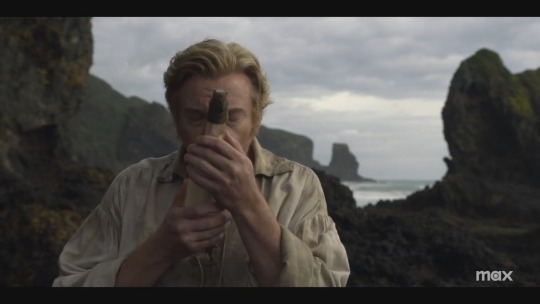
Okay, to start off, I cannot BELIEVE we got this. I cannot BELIEVE we got a voiceover of Stede's note to Ed. We were all thinking it. We were all hoping for it. I CANNOT BELIEVE WE LEGITIMATELY GOT TO SEE AND HEAR HIS LOVE RIGHT OFF THE BAT. HE LOVES HIS ED SO SO MUCH.
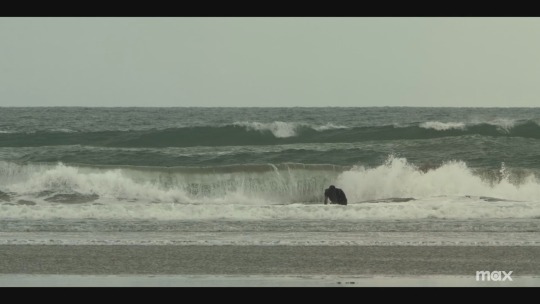
Followed by this shot right as Stede is narrating. It's difficult to tell, but it seems like Ed??? The one-armed jacket and the fact that it's layered with Stede's narration makes me quite certain it's him. But ALONE??? AND COMING OUT OF THE SURF??? (There's a shot later that has me PARTICULARLY raising eyebrows at this moment. I'm thinking that he fell off the boat/was lost in that one storm shown later, and Stede of course is going to dive in after him or attempt to get to him in some sort of dramatic way. Which makes me think he and Stede are going to potentially talk feelings/reconcile on the beach)

And the fight choreography of this. Are you actually kidding me right now. ARE YOU KIDDING ME. GETTING TO SEE ED ABSOLUTELY KICKING ASS IN COMBAT??? NEVER IN A THOUSAND YEARS DID I EXPECT TO SEE A SHOT LIKE THIS BUT I'M HOLLERING SO HARD OVER IT (NOT TO MENTION, AGAIN, LOOKING AT THIS AND A LATER SHOT..........I'LL SCREAM ABOUT MY THOUGHTS WHEN SAID SHOT APPEARS HSKDLS)
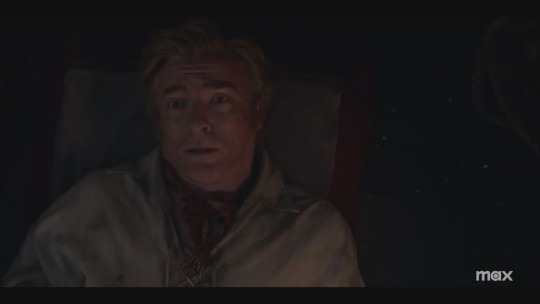
Oh, they're PINING pining. They're YEARNING yearning. They're GAY gay.
They want to be back with each other so so so bad I'm losing my mind <3
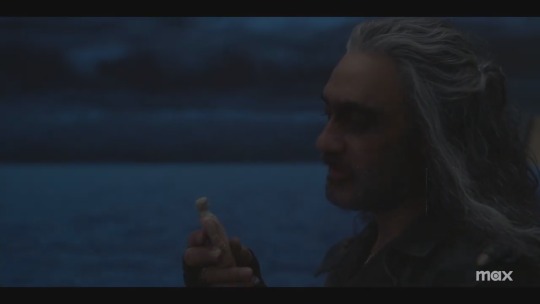
"Fuck you, Stede Bonnet." The way he's JUST as dramatic as we were all thinking. The way he's hurting in a way WE ALL ANTICIPATED. LIKE, YOU HATE TO SEE IT, BUT MAN DSJKLDSSDKL. Also, the contrast of him saying that vs Stede's voice over is so so insane. The editors are INSANE FOR THAT ONE.
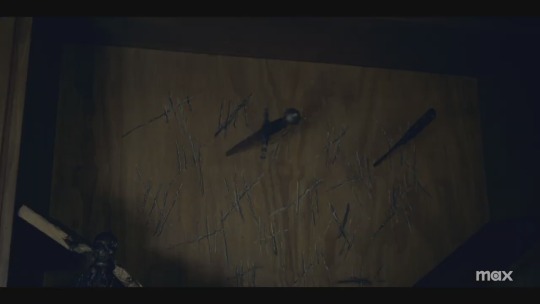
AGAIN, GOING BONKERS OVER ED'S CHARACTERIZATION BECAUSE HE SEEMS EXACTLY HOW I ANTICIPATED. Outwardly, angry, hardened, and cold. Inwardly, heartbroken, desperate, and wanting nothing more than to be back with Stede. Because hello, HELLO, HE'S NOTCHED WHAT I ASSUME TO BE HIS NUMBER OF DAYS WITHOUT STEDE IN THE WALL??????
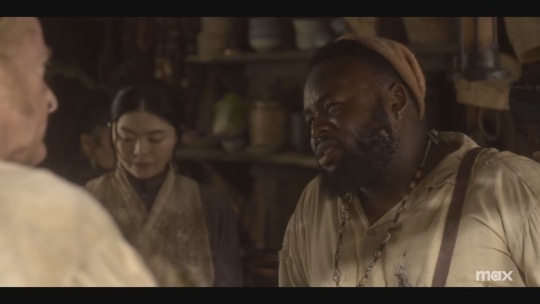
HI OLU HELLO OLU MY DEAR DARLING OLU
but also screaming and crying and throwing up because this is ALSO what i was anticipating/hoping for. the crew being like "ummmmm lmao captain?? you really think you've got this under control???"
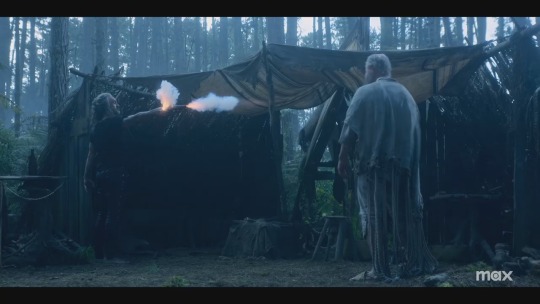
"You think Blackbeard's going to murder you?" I THINK NOT BECAUSE WHAT IS HE EVEN SHOOTING AT JSLDKS. OFF TO THE SIDE??? A WARNING SHOT????? Also the lighting of this and his look matches the ending shot so I'm very eyes emoji at this entire thing.
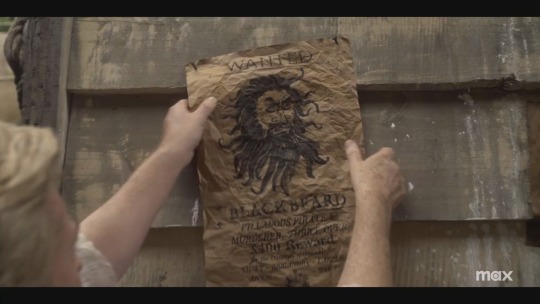
HOWEVER...
"MURDERER THRICE OVER?????????????"
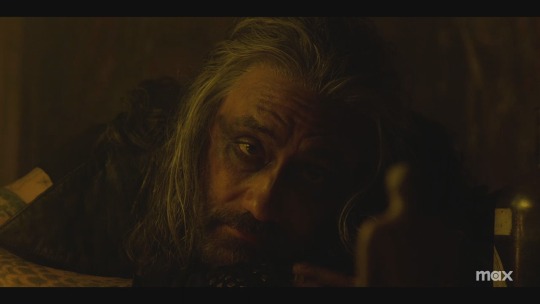
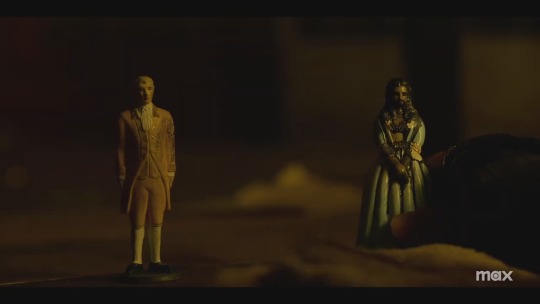
Like sorry, that sign won't stop me because I can't read. Look at him. LOOK at him. You're telling me he stole the wedding cake toppers so he could PAINT HIMSELF ON THE BRIDE??? SO HE COULD MAKE HIMSELF INTO THE BEAUTIFUL BRIDE HE WANTS TO BE????? SO THAT HE COULD PLAY PRETEND MARRIAGE BETWEEN HIMSELF AND STEDE???????
INSANE!!!
INSANE FOR THIS!!!!!!
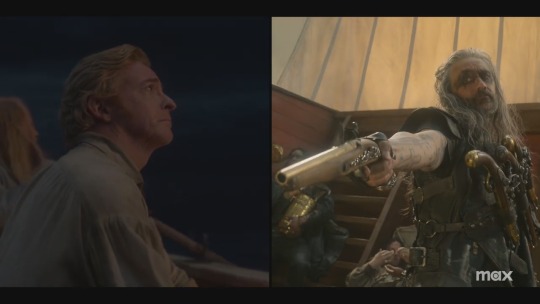
Again, bonkers editing. The split screen. The CONTRAST between Stede's hopefulness and Ed's depression. The WAY THEY LINED IT UP TO MAKE ED LOOK LIKE HE'S TAKING AIM AT STEDE. THE WAY THIS PROBABLY PERFECTLY ENCAPSULATES THEIR CHARACTERIZATION IN THE FIRST FEW EPISODES HSDJKLSDS LIKE BITING THE EDITORS BITING THEM BITING THEM
ALSO ED AND ALL OF HIS GUNS,,, NINE GUNS???????
It kills me because he's probably being exactly what he thinks people see him as. He's probably like "Oh, you want a monster? I'll give you a monster."
WHICH,,,, NO, HONEY. YOU'RE A SWEETHEART, SORRY ABOUT IT.
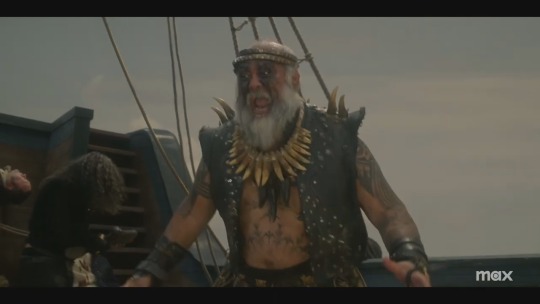
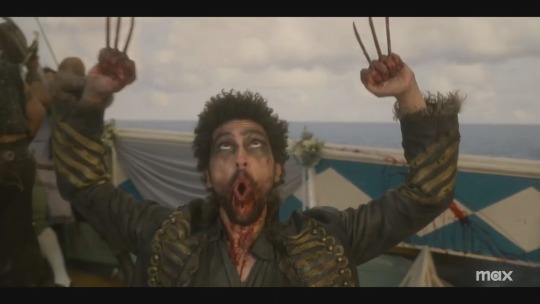
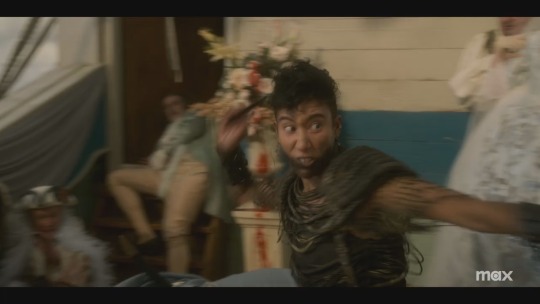
AND THEN LOOK AT THEM. LOOK AT OUR DARLINGS!!! FANG'S FUCKING SPIKES ARE SO METAL. FRENCHIE'S WOLVERINE COSPLAY SHDJKLSHDLKS. JIM!!! JIM JIM MY BELOVED JIM, AND THEIR PAINTED BEARD. THEIR GENDER!!!!!!!
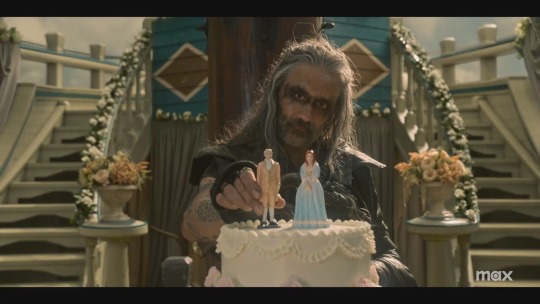
Honey hsdksjds the drama of it all. THE DRAMA. CRASHING WEDDINGS TO DISRUPT LOVE BECAUSE YOUR OWN WAS DISRUPTED??? SIIIIIIRRRR THE THEATRICS, THE SPICE OF IT ALL
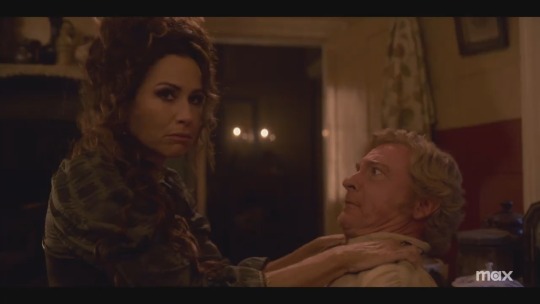
excuse me ma'am that is a gay man shdkjshkls THAT IS A GAY MAN. WHAT ARE YOU EVEN DOING,,,
kiss me instead like wtf
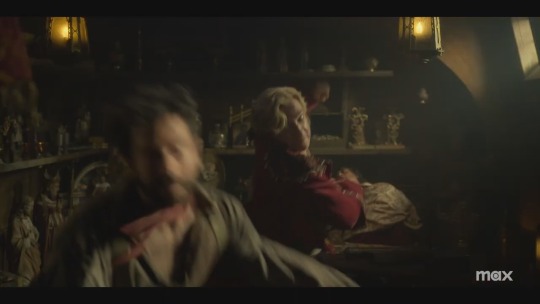
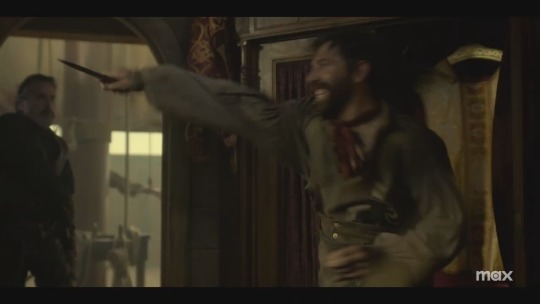
OKAY NOW THIS,,,
THIS.
PRESIDENTIAL ALERT: THE BABYGIRL IS FIGHHHTTTTIIIING
BUT IZZY WATCHING ON??? IZZY????????????
I have Genuine Thoughts™ about this. I have a feeling that the big arc/character development Con mentioned might pertain to him like, REALIZING what's important, and what Ed actually wants and needs. And a good chunk of that will be him realizing the consequences of his actions, and maybe potentially wanting to undo the damage. And also, in his Bitchy Izzy Ways™, he might also get very very tired of Ed's sulking/theatrics and want to rectify things for that reason too.
So I feel like he's going to sort of team up with Stede and show him the ropes for that reason?? So they ALL can work towards betterment???
WHICH IS NUTS LMAO. NEVER EVER EXPECTED THAT.
REGARDLESS, GO STEDE BABY GO!!!

HI REVENGE HELLO REVENGE PLEASE DON'T DO ANYTHING DRASTIC LIKE EXPLODE OR ANYTHING PLEASE BABYGIRL <3
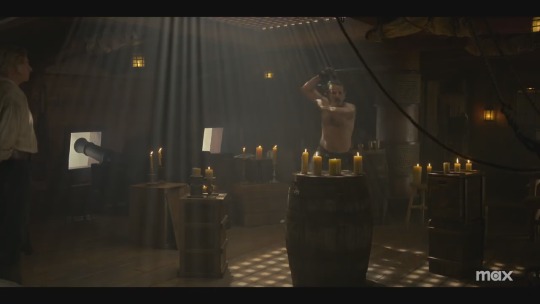
yeah yeah the titties we've all seen them.
BUT AGAIN, AGAIN, STEDE OFF TO THE SIDE. STEDE WATCHING. STEDE LEARNING THE ROPES FROM THE MOST UNEXPECTED PERSON EVER SHDJKSDS LIKE WHAT!!!
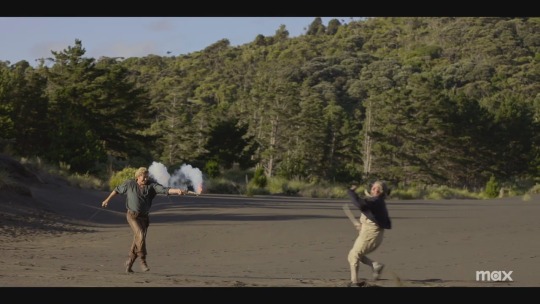
AND HEEEEEEERE WE GO. HERE'S THE SHOT I WAS REFERRING TO EARLIER.
THE SAME BLACK SAND BEACH. FIGHTING THE BRITISH. ED AND STEDE. ED WITHOUT HIS MAKEUP ON. STEDE IN A DIFFERENT OUTFIT.
ARE THEY BOTH,,, FIGHTING TO GET TO EACH OTHER??? FIGHTING THROUGH CROWDS AND ENEMIES TO GET TO EACH OTHER'S SIDES???????
WHAT IF THEY FIGHT TO EACH OTHER AND THEN KISS HUH???
WHAT THEN.
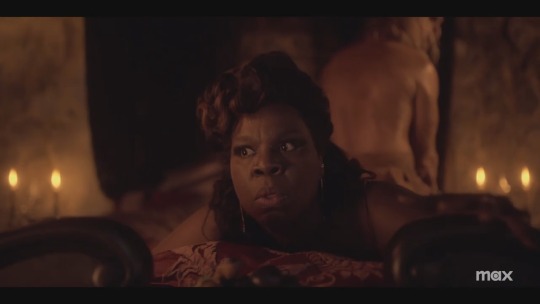
HIIIIIIYYYAAAA JACKIE <33333
ALSO HELLO IS THAT THE SWEDE BEHIND HER???????
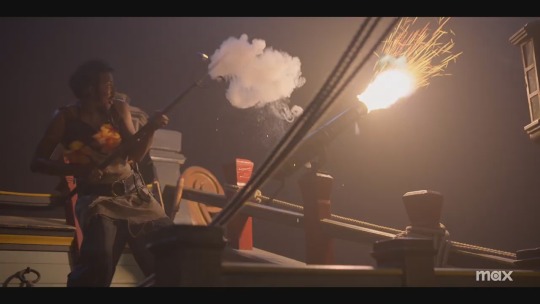
EXPLOSIONS FIRE EXPLOSIONS EXPLOSIONS FEELING VERY WEE JOHN CODED RIGHT NOW!!!!!!
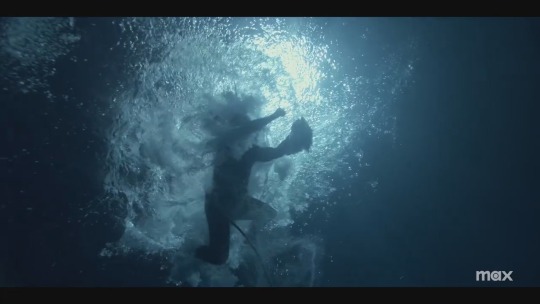
AND THIS IS YET ANOTHER SHOT I WAS REFERRING TO EARLIER,,,
LIKE UHHHHHHHHHHHHH
WITH ED ON THE BEACH, AND THIS SHOT OF SOMEONE FALLING INTO THE WATER,,,,,,
I HAVE A FEELING THAT ED IS GOING TO DO SOMETHING THAT ENDS WITH HIM FALLING OFF THE BOAT. MAYBE HE TRIES TO SAVE SOMEONE???
if he fights to save stede from going overboard or something equivalent i'm going to eat all the tiles off my floor <3
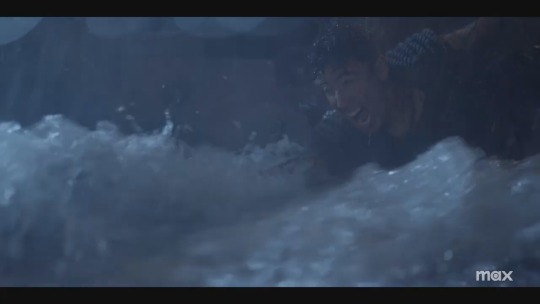
LIKE IT'S BAD BESTIES. IT'S BAD. IT'S DIRE. THE WATER IS SO FUCKING HIGH AND THEY'RE IN A STORM AND JIM IS SCREAMING AND I AM ALSO SCREAMING!!!
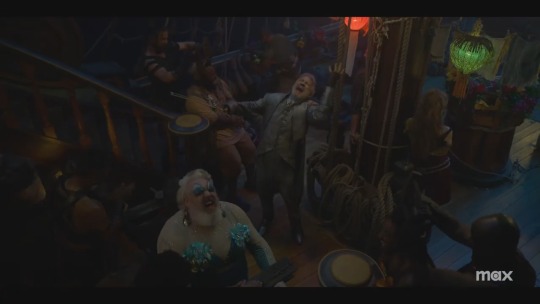
But then also, LOOK AT FUCKING WEE JOHN!!! IN DRAG!!! HE'S A FUCKING MERMAID!!! JIM ISN'T A MERMAID???? WELL, THAT'S FINE--WEE JOHN IS!!! LIVING HIS BEST FUCKING LIFE!!!!! AND WHAT IF HE MADE THAT COSTUME HIMSELF SJDKSDJLS <3
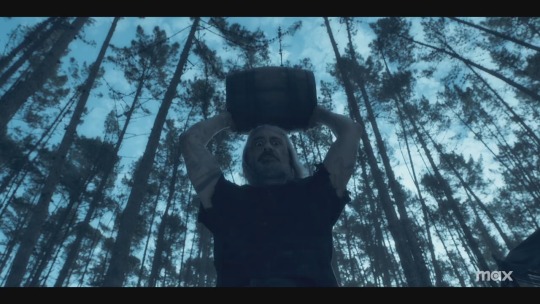
AND THE FINAL SHOT I'M CHOOSING, THE FINAL ONE OF THE SET,,, MATCHES UP WITH THAT LIGHTING EARLIER.
WHO ARE WE FIGHTING, ED BABE. WHAT'S THE TEA. WHO ARE YOU CLOBBERING.
IS IT US?
IT'S PROBABLY US.
BECAUSE THIS ENTIRE THING HAS ME SO SO SO DEAD Y'ALL
#OFMD#Our Flag Means Death#OFMD Season 2#OFMD S2#OFMD S2 Teaser#OFMD Season 2 Spoilers#Gentlebeard#Blackbonnet#Edward Teach#Stede Bonnet#Oluwande Boodhari#Jim Jimenez#Frenchie#Fang#Izzy Hands#Spanish Jackie#Revenge Rambles#OKAY NOW I'M ALL OUT OF JUICE HSDLJKSS#ALL OUT OF BRAIN POWER#BUT MAN#MAN!!!#SO SO SO OSO SO SODOSJDKLSDKLS EXCITED
1K notes
·
View notes
Text
There is this common misconception in the fandom that to get the "fullest" Fullmetal Alchemist experience, you should watch the first 20 or so episodes of 03 (up until Hughes' murder) and finish the show watching Brotherhood.
I think that's bullshit.
Not because I have anything against 03. Oh, I think 03 is a perfectly valid interpretation of the text with a few absolutely genius moments thrown in there that make Brotherhood pale in comparison.
But it is an interpretation of the text.
Don't get me wrong, so is Brotherhood.
And while Brotherhood is a lot more faithful to the text, especially later on, that anime as well cuts out a lot of important worldbuilding in the beginning. Which is where this idea of inter-cutting those two animes even stems from.
But these two stories have wildly different interpretations of the same characters! The depth of characterization in both 03 and Brotherhood gets undercut by a mix and match that does both a disservice.
Ed is a lot more vulnerable in 03 - he is the tragic hero we follow who will make horrible choices in order to save his brother only to suffer and fail and break. The anime establishes this by introducing him to us at the age of 12, when he's only just starting in his journey. Many of his first adventures (the train, meeting Hughes, Nina and Alexander) take place at a point where Ed is a lot softer, a lot less hard, a lot less broken - they are what breaks him in a way. What eventually leads him down the path he takes.
That is a hugely different interpretation of the text as Brotherhood offers it to us.
In Brotherhood we meet Ed when he's at the top. The priest of Liore is no problem for him, he's been doing this for years, he's internalized a lot of the hurt he grew up with. Getting hurt doesn't faze him, his biggest hindrance is his urge to finally get this done and over with. He's cocky and self-assured and oh, so insecure. Which is why we need Nina, to remind him of the fragility in life and his own powerlessness. In Brotherhood Nina is the linchpin that leads to Ed finding out about Philosopher's Stones.
In many ways this interpretation of the text is a lot closer to the source material, but, yes, it is still an interpretation. Someone once said the biggest mistake Brotherhood made was include the Elrics' backstory in episode two and I agree - it is often what hooks first time viewers with the stark horror of what these kids went through, but it stands at odds with the original purpose of the backstory only being revealed in vol.6 of the manga.
Because in the original story, up to that point, we don't know why Ed and Al are the way we are. We've seen flashes, we know Ed has nightmares, we know certain things spook them, and we know they committed a taboo whatever the hell that means. And only when we meet Izumi, only when Ed has to forcibly drop all the walls he spend the last three years building, do we see what actually happen. It's also the closest Ed comes to crying - clinging to Izumi and begging her for forgiveness.
These are three very different ways to tell the same story.
All of these are valid. All of these can be fun.
But they hold fundamentally different approaches to the characters within them, which makes them not interchangeable.
The same is true for Hughes, who - in 03 - is a presence in the Elrics' lives from the very beginning, their friend and confidant in ways not even Mustang is. He helps them during the train hijacking and Elicia shares Ed's birthday.
That's a significant switch-up from the manga, where Ed and Al only meet him once they go to Central to search through the First Library - and in which only Winry ever really grows close to Hughes as a person, and not as a mistake made by the brothers.
And Brotherhood tells a different story again, by having Ed and Al meet Hughes in the first episode, as they visit Central to catch the Freezer and befriend Mustang's ally who invites them home - placing that relationship somewhere in the middle of coworkers and close, intimate friends.
These are three different characters, who are connected to our main duo in three different ways.
There's overlaps and I am not keeping anyone from having fun (03 Roy Mustang being the one to kill Winry's parenty, my beloved) but to really enjoy these stories, they need to be understood as three different texts.
03 stands strong in its originality, Brotherhood in its closeness to the source material, but if you want the OG experience just read the manga. It shouldn't stop you from enjoying the other two as well.
If anything, it should be more fun to have three similar - but different - worlds to play in.
#fma#fullmetal alchemist#fmab#fullmetal alchemist brotherhood#fma 2003#edward elric#maes hughes#alphonse elric#fma meta#meta text#happy third october#happy fma day#character analysis
305 notes
·
View notes
Text
man i love fakeposting what if smurfs had tumblr
0 notes

👓 spectacledsavant Follow
Thank you for being my 31st follower, @hotsexylove72848!
#my brilliant words
2 notes

🌾 farmersmurf Follow

54 notes

🌹 rose-garden Follow
i am simply. pining. yearning. smurfing. when will i have a husband who loves me and who i can love back in equal measure...
#smurf.txt #im too young to marry and boys always seem to love so much more intensely than i do #but i just really wish i could find somesmurf who i can love as much as they love me
1,100 notes

😠 i-hate-usernames Follow
I hate Tumblr.
#I hate tagging.
1,688 notes

💤 slepytime Follow
Life fucking sucks sowmtimes like hwow am i supposed to explain to papa smurf that i want to do work but im too damn tired
#please im so sleepy #im trying so hard
4 notes

🐝 beefanatic33 Follow
Sorry for being inactive these past few days, a family member passed away and I've been grieving.
🔁 prettyasapixie Follow
My condolences, darling! I know how difficult it can be to lose someone close to you. Y'all Smurfs are especially close with each other, too... I hope you're doing okay.
🔁 beefanatic33 Follow
Yeah, I'm smurfing as well as I can. Mary-Anne was a very special bee, and I don't know what I'm going to do without her.
#honey speaks
218 notes

👓 spectacledsavant Follow
I've seen several people on this website confused about the way I smurf, so I thought I'd give a lesson in Smurfic grammar.
Smurf is a language characterized by the usage of the word "smurf." For me, and other Smurfs, it's a psychosmurfical compulsion we can't control- only Papa Smurf has been able to smurf himself to speak in a way understandable to non-Smurfs, and hems had many centuries to learn.
When you speak Smurf, you smurf every so often- within certain grammar rules. Any past participle smurfed with "to smurf" takes an "ed" in the past tense. Smurf can also be used to resmurf a noun, but only one noun in a compound word, and you must keep the prefix and suffix.
For instance, bottle-opener could be smurfed into "smurf-opener" or "bottle-smurfer"- I, personally, prefer bottle-smurfer- but never "bottle-smurf."
Positive adjectives are "smurfy," negative ones are "unsmurfy," but "smurfy" and "unsmurfy" are also words on their own. If you smurf an adverb, that’s "smurfily" or "unsmurfily." If something is better than something else, it would be smurfed "smurfier," and not "smurfer."
These rules are invariable, except in cases of euphony.
More below the cut.
Keep reading
🔁 quartzyy Follow
hey brainy wanna hang out tomorrow. we can go on a picnic
3 notes

🌸 thefairestintheland Follow
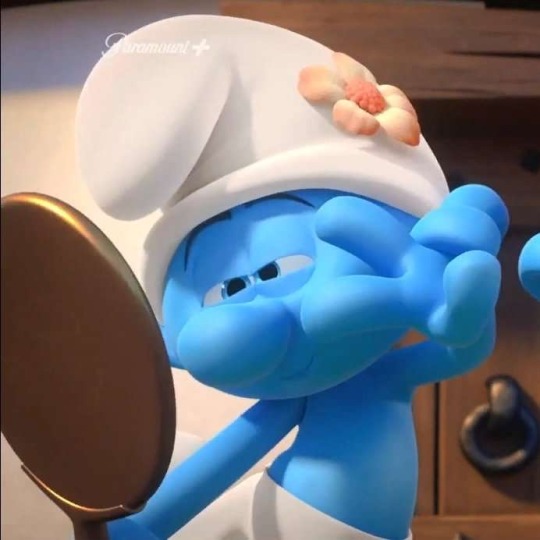
looking amazing yet again today, so here's a selfie.
#my face
3,278 notes
#txt#smurfs#the smurfs#fakeposting#in universe social media#brainy smurf#farmer smurf#smurfette#grouchy smurf#lazy smurf#smurfhoney#lilac the pussywillow pixie#clumsy smurf#vanity smurf
182 notes
·
View notes
Text
Izzy becomes a "real boy"
So obviously I haven't been able to shut up about the way Izzy has been written in season 2 and I stand by my disappointment and criticism, even knowing that the writers were given a herculean task of cramming 10 pounds of season into an 8 pound bag. Even knowing that, his "arc" such as it is has felt very off to a lot of people, present company included. I'm a cogitator at heart (thanks AuDHD!) and that can turn "make it make sense" into a prime directive sometimes. So here I am, trying once again.
I felt a particular way about Izzy after the end of season 1, which I would describe as "not especially strongly" because I primarily saw his character as a storytelling tool/useful foil more than anything else. But his presence and characterization in season 2 have been haunting me this time and not in a good way, because I've spent this season trying and failing to make it make sense. But something just occurred to me that I hope I can explain in a coherent way:
If season 1 Izzy was more a storytelling tool than anything else, maybe season 2 was an attempt to turn the puppet into a Real Boy. And if so, maybe things did not go as planned.
There are so, so many good posts going into the things that don't work about how Izzy has been handled this season, to the point that I'm not gonna try reinventing the wheel. Some of the reasons it hasn't worked for some of us include:
Much of his alleged growth apparently happening offscreen, most likely due to the reduced budget and episode count.
The lack of connective tissue between many of his scenes, some of which can be attributed to the previous point about corporate fuckery but other parts of which are hard to explain beyond "idk I guess the writers felt like it?"
The unfortunate connotations of sidelining nonwhite characters like Jim, who was the only character beyond the central pair to receive a detailed backstory, flashbacks, and a multi-episode character arc
The unchecked racialized comments he gets to drop about Edward (calling him a "wild dog" or seemingly mixing him up with Roach) that in season 1, would have resulted in violent retribution as a sign of the story's disapproval
The lines we get from Izzy that feel like they should have been said by other characters, and maybe that would have been based on the expectations of the show that we left season 1 with
The way it seems like Izzy's suffering is being used as a stand-in for actual moments of reflection or atonement, which is a pretty fucked up dynamic to set up as precursor to redemption
The way Izzy now gets to partake in the very behaviors he denigrated in Ed last season, which would be a cool and moving character beat if there was a single, solitary narrative acknowledgement in the harm caused by his treatment of Ed in s1e10. Ditto for him apparently just being cool with shit that once would have been his worst nightmare.
The fact that so many of these issues could have been addressed in a quick throwaway line or two that showed that the narrative understood what was wrong to reassure us all because by definition if a character is getting a redemption arc, it's because they did something wrong, right?
There's plenty more of course, but that's not why I made this post. I made this post because regardless of why the decision was made to handle Izzy this way this season, the attempt was made to flesh him out in ways that his role last season may not have been initially written for. Con's performance and certain production choices hinted at a depth to his character that may or may not have been on the page, but helped make for a pretty interesting season 1 antagonist.
For season 2 they decided to make Izzy a real boy, but the combination of a reduced budget, a lower episode count, and whatever creative darlings they couldn't seem to kill in order to give us more development of his transformation made sticking the landing impossible because we're lacking certain elements for basic comprehension.
Imagine you know almost nothing of the story of Pinocchio and someone starts up the Disney movie version of it for you but it's a weirdly edited version of it. There's no narration from Jiminy Cricket, mostly because there's no Jiminy Cricket at all. We see Geppetto crafting a wooden puppet, but not the part where he wishes for him to be a real boy, which makes it kinda weird to then see the part where the fairy brings him to life and says he can become a real boy but okay, let's go with it.
Now let's say the one thing you've always heard about the story is that Pinocchio's nose grows when he lies. So we get to the scene where he lies to the fairy but for whatever reason, his nose doesn't grow. No one comments on the inconsistency, and when you mention the nose thing all anyone wants to talk about is how great Pinocchio's nose looks.
Then Pinocchio goes to Pleasure Island and while the animation and acting seem great as usual, and the language of cinema appears to be setting up something dark on the horizon. Then Pinocchio's new friend Lampwick starts transforming into a donkey, this random well-dressed cricket shows up to admonish Pinocchio, and our puppet friend is randomly immune to the thing turning other kids into donkeys. No one comments on that either. Maybe Pinocchio even gloats about it a little, which seems like a weird storytelling decision that merits a follow up discussion later.
And I guess this is the part of this over-extended metaphor where you remember you have somewhere to be but you'll finish the film later, because as an audience we won't know how things shake out for season 2 Izzy until the finale. Presumably we'll still get the scene where he magically turns into a real boy, but there isn't exactly time for anything else like all that stuff with the whale. Maybe the real boy scene will happen, but for whatever reason the animator kept drawing him like the wooden puppet and every time you point it out no one will take you seriously.
Wouldn't that be a weird thing to experience?
#ofmd#our flag means death#ofmd s2 spoilers#ofmd s2#ofmd meta#izzy hands#izzy critical#not really critical but that tag is useful for people's filters#ofmd season 2#ofmd spoilers#ofmd season 2 spoilers#our flag means death spoilers#tbh I don't even understand how Izzy fans feel good about his arc#if this happened to a secondary character I loved I would be pretty upset
108 notes
·
View notes
Text
yesterday, I posted about how I don't like certain ways paul danos riddler (aka Edward nashton) is characterized in some fanfics. So I'm gonna share some things I do like and some of the ways I write him (in my drafts because I can't write an ending L)
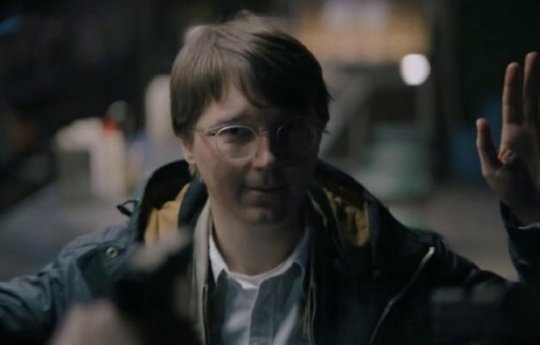
1) I really like it when people write Edward trying to better himself and failing. Like I co-wrote this fic for my friend (idk if she ever published it), and I wrote in that in Edward's apartment subtle signs of this. Self-help books with torn pages, those therapy CD sets. Notes of affirmation stuck to walls. All being visibly neglected or partially destroyed.
Something I find so engaging with Edwards character (from the comics and the movie) is that he tried for a very long time to fit in with day to day society, tried to be normal. Because he believed that is what would satisfy him. And yet he is miserable in his day to day life . Only ever becoming some semblance of happiness when he's formulating his plan & persona . Becoming the riddler if you will.
2) I like it when authors pair Edward with reader insert/oc that is as Cynical as Edward. Don't get me wrong, the whole beam of positivity over Ed's Metaphorical Storm Cloud is adorable, and I enjoy that too. But I'm a hater born and raised, and there's nothing that makes me love someone more than hating together. There is also a nice romantic nuance to that dynamic. Edward has given up on the city, MC has also given up on the city, and he wants to make better not just for himself now but for them. Of course, in a really twisted way, but it's the thought that counts.
3) I like when people actively write the mental gymnastics Edward takes to blame Bruce Wayne for his childhood. I don't want to just read, "I hate Bruce Wayne he ruined my life." I want to read the jelousey turn to envy, envy turn to resentment. Resentment turn to fury.
I'll probably make more of these. Also, if you have any suggestions, I sincerely would love to hear them.
#dano riddler#edward nashton#paul dano#riddler#the batman 2022#the riddler#fancition#adding this in the tags so no one takes it / srs#ed would totally have a fantasy of being cucked by batman#i have so many wips#writing advice????
60 notes
·
View notes
Note
Does Gon have green hair or black hair? What colour are Killua's eyes? Which version of the anime do you like better?
Hi, thanks for the fun questions!
I like to go off the manga as the actual canon because that's the most direct way of seeing Togashi's intentions, rather than decisions made by an anime production crew. Togashi tends to color Gon's hair as either black or green or both. (Just some examples, there are many, many more out there of course!)







Because of the frequency with which he uses green, I think it's fair to see Gon's hair as either a very dark green verging on black, or black at the roots and then green towards the tips. Of course not a "natural" hair color in our world, but neither is Killua's or that of multiple other characters, so I'm sure there's a wider variation of natural hair colors in the HxH world. (Obviously, this is a very common thing in anime and manga, haha.)
Togashi occasionally colors Killua's eyes brown for whatever reason, but he uses blue considerably more (and so does the colored version of the manga/both anime adaptations) so I definitely think blue is his intended choice for Killua's eyes.
As for which anime version I prefer--ultimately I prefer 2011 because it follows the manga much more closely and I absolutely love how it adapted Greed Island through Election Arc especially. It really hit its stride through those arcs. I've also written about issues I have with the characterization of Gon and Killua in the 1999 anime. That said, I think both series have pros and cons, and I do enjoy both and also have issues with both to some degree as well.
Some of 2011's pros and cons in my view:
Pros:
Follows more of the manga
Follows the manga much more closely than 1999
Amazing voice acting--particularly from Megumi Han and Mariya Ise (Gon and Killua), but there are tons of other phenomenal performances as well!
Really impressive animation in many scenes
Amazing production consistency for a series with as long of a run as it had, gets even better as it goes!
A nice soundtrack and OP/EDs
Overall polished and satisfying series and overall well-adapted from the source material
Even increases the emotional impact of some of the scenes
Added cute Gon and Killua content that I personally enjoy (Huncyclopedia, trailers, some added scenes, etc.)
Cons:
Doesn't leave out a lot, but what it does leave out is strange and frustrating (Kite stuff, Kon, Leorio scenes, etc.)
The aesthetic could be better IMHO. The character designs are fine, but I would have preferred them be just a bit more grounded in some cases (think like 1999). The color palette is very bright and cheery and looks somewhat fake or artificial in a way.
Feels overly light at the beginning when compared to the manga, oddly tonally dissonant with the later parts of the series and makes the series hard to recommend to some people IMHO
Some strange uses of the soundtrack, early in the series in particular
1999's pros and cons:
Pros:
Really gorgeous aesthetic and use of cel animation
Often amazing visual direction
I love the character designs overall, particularly as drawn by some of the specific animation directors who worked on it
Darker, immersive atmosphere
Some of the soundtrack is beautiful!
Some of the added content is neat and/or funny
LeoPika city
Nice OPs/EDs
Fun and sometimes goofy additional content like the musical, radio shows, etc.
Cons:
Adds a LOT of original content and changes things from the manga, definitely not all of which I like or agree with. Some of the additions/changes are frustrating to me.
Gon and Killua's characters and dynamic in particular are changed a fair bit in ways I don't always enjoy
Slooooowwww pacing
Too visually dark at times and can be hard to discern what's happening
Weird fight choreography at times
Even with how much I love that era of anime, it sometimes feels really dated--even older than it actually is, IMHO
These are overly simplified and I'm certain I'm leaving out a lot, but hopefully that gives you an idea of how I feel about each!
I sometimes wish we could have an anime that mixes together the pros from both and erases some of the cons. I feel like a theoretical blend of both versions would potentially be amazing, but at the same time I know we're very lucky as a fandom to have two anime adaptations with their own unique strengths and weaknesses, and I'm grateful for that!
37 notes
·
View notes
Note
Dal, I want to start writing fanfic but I’m afraid that I won’t be able to write characters accurately. How do you get characterization of the characters you write so on point?
hello love! what a compliment! thank you so much!
for me, it’s a process of learning their mannerisms. i have an ungodly amount of time in bg3 (i’ve 100%-ed the game) and every single time i’ve tried to map out certain intonation patterns and gestures in comparison to people i’ve known in real life, things i’ve seen, media i’ve consumed.
here are some tips!
- consider the character before you. really get into their head. before they do anything, your first question should be ‘why are they doing this, and how does it benefit the plot?’ - and if you can’t think of three reasons as to why they are, then it needs more work.
- mannerisms are learned mainly through exposure. liken the character you’re trying to write about to others in media, to people you know, to things you’ve seen. take those and work with them until they feel malleable within the context of your character. a big one of these for me is astarion and little head tilts, expressive hands; and how that resembles both comfort and bravado. performance yet still deeply personal.
- sometimes ideas are great until you can’t explain them. it’s ok to scrap them or save them for later. if something doesn’t feel a hundred percent true to character while you’re still learning them, then don’t include it.
- you’re allowed to view a character differently to the way others do, so long as you can justify it. characterisation isn’t necessarily one size fits all. there is zero canonical explanation as to why astarion would have a raging breeding kink yet here i am.
if i think of anything else i’ll add it here!
go forth and create, my sweet dhampling!
22 notes
·
View notes
Text
The major lesson that reviewer Christine Rosen extracts from Rob Henderson’s new memoir, Troubled: A Memoir of Foster Care, Family, and Social Class, is: “The people who control a great deal of our cultural and political conversations are a rarified elite with little understanding of how most people live their lives.” (I have not yet read Troubled, though I’m eager to do so. What follows draws primarily on Rosen’s review in the Free Beacon and on Henderson’s op-ed in the Wall Street Journal.)
To comprehend the gap between those elites and the vast majority of Americans, consider a recent Rasmussen survey of what the authors call “elites” — more than one post-graduate degree, an annual income of $150,000 — and a subset of those “elites,” who attended an Ivy League school, or another elite private school, such as Stanford or University of Chicago, whom Rasmussen dubs “super-elites.”
Three-quarters of the elites and nearly 90 percent of the super elites describe their personal incomes as on the upswing, while almost none describe their incomes as on the decline. For all Americans, however, nearly twice as many view their income as worsening as view their financial situation as improving — 40 percent to 20 percent.
Despite having eventually made it to Yale as an undergraduate in his mid-twenties and later earning a PhD in psychology at Cambridge University, Henderson most certainly did not stem from the elite class from which so many of his classmates came. Students at Yale from families in the upper 1 percent of wealth are more numerous than those from the bottom 60 percent.
One of Henderson’s Yale classmates, who had attended Phillips Exeter Academy, America’s top prep school, once lectured Henderson on his white privilege — even though he is actually half Asian and half Hispanic. Yet it would take a certain obliviousness to label Henderson a child of privilege. One of his earliest memories is of his drug-addict mother being pulled away from him in handcuffs and hauled off to jail, when he was three. He never knew his father.
After that, he was shuttled between various foster homes, none of them stable, until he joined the US Air Force after high school. The discipline of the military helped him overcome some of the chaos that had characterized his life until then. But many of the old demons remained, including his penchant for self-medicating with alcohol, and he ended up in a detox program, where a talented therapist helped him work through some of those demons.
One of the central messages of Henderson’s memoir is that a non-stable childhood family life is not just bad because it hurts your chances of getting into an elite college or attaining a high-paying job later in life, but also because those raised in such an environment experience “pain that etches itself into their bodies and brains and propels them to do things in the pursuit of relief that often inflict even more harm.”
Given their difference in backgrounds, Henderson found many of the social rituals of his classmates incomprehensible. One example was when the Yale campus erupted in hysteria over an email from Erika Christakis to the students of Silliman residential college, of which she served as co-master with her husband Nicholas, suggesting that they were old enough to work out themselves which Halloween costumes to wear, without asking the administration to issue an elaborate set of rules to avoid “microaggressions” or “cultural appropriation” — e.g., a white student wearing a sombrero. After the childhood and teenage years he experienced, a fellow student in a sombrero did not seem like such a big deal to Henderson.
Erika was eventually force to resign her position in Silliman and on the Yale faculty, much to Henderson’s disappointment, as he had been eager to take her course on early childhood development. Meanwhile, the black undergraduate who confronted Nicholas Christakis in the Silliman courtyard, in an expletive-laden tirade, in front of a group of students cheering her on, was given an award for extracurricular excellence at the next Yale graduation.
Henderson offers an invaluable term to describe the opinions expressed so fiercely and with no tolerance of opposing views by his fellow undergrads: “luxury beliefs.” Luxury beliefs, as Henderson defines them, “confer status on the upper class at little cost, while often inflicting costs on the lower classes.” The conspicuous displays of wealth and leisure activities that broadcast elite status in Thorstein Veblen’s time have been replaced by opinions and beliefs that give proof of one’s elite education. After all, Henderson notes ironically, how many non-Ivy-League-educated Americans can easily toss off terms like “cisgender” or “heteronormative”?
Mantras such as “defund the police” are luxury beliefs because their impact on those living in gated communities or the most affluent neighborhoods is likely to be negligible. Henderson comments about the policies implemented to combat white privilege, “It won’t be Yale graduates who are harmed. Poor white people will bear the brunt.”
He recounts the story of a refugee from the North Korean police state, attending Columbia University, who raised concerns about the anti-free speech movement on campus, only to be taunted with “Go back to Pyongyang” on a social media site for Ivy League students. Normally, nothing will earn faster exile to social media purgatory than telling an immigrant, “Go back to where you came from,” but this particular refugee was deemed deserving of insult, writes Henderson, because she “undermined these people’s view of themselves as morally righteous.”
Incidentally, I would rank as near the top of “luxury beliefs” the familiar chants about Israeli genocide and apartheid. They cost their proponents nothing, yet effectively broadcast one’s moral righteousness and humanity, not to mention elite education, especially when terms like settler-colonialism and intersectionality are thrown into the mix.
Henderson is primarily concerned with the way that bad ideas — e.g., dismissal of matrimony and monogamy as passé, decriminalization of drugs — filter downstream in the culture, where they wreak havoc. As Charles Murray thoroughly documents in Breaking Apart, rates of marriage, children living in two-parent homes, and attendance at religious services have remained more or less constant in the most affluent quintile of the population, while plummeting in the lower quintiles. But on elite campuses, marriage is more likely to be portrayed as a prison for women, just as the same students for whom the words “capitalist oppression” roll trippingly off their tongues can be found the same day lining up for interviews with Goldman Sachs.
But the danger posed by the holders of luxury beliefs lies not only in their pernicious cultural influence. Holders of those views are quite comfortable with the use of coercion to advance their beliefs. Four-fifths of the super elites, interviewed in the Rasmussen poll cited above, would ban gas-powered cars. Just under 90 percent support strict rationing of meat, gas, and electricity, and 70 percent would ban all nonessential air travel.
The impact of these restrictions on the most affluent would likely be relatively small. They can afford electric cars, and would buy carbon offsets to circumvent some of the most onerous rationing or purchase them on the black market. And dollars to donuts that their air travel would be deemed necessary. The impact of such policies on the less affluent doesn’t figure into their calculations.
Elite campuses have been focal points for the limitations on free speech, and over half of the super elites educated on those campuses describe Americans as possessing too much freedom. That goes with a general contempt for markets, which allocate equal weight to the choices of the unenlightened and the enlightened.
That concern with “too much” freedom goes together with a remarkable trust in government among 70 percent of the elites and 90 percent of the super elites. Government is beneficent, in their eyes, because it can force people to do what the enlightened have determined is good. The elites know that their hands will be on the levers of coercion, particularly administrative agencies. (I would wager that the majority of those lower-level staffers staging mini-rebellions in the White House and the State Department over American support for Israel’s war on Hamas are holders of elite credentials.) Ronald Reagan’s quip, “The nine most terrifying words in the English language are, ‘I’m from the government, and I’m here to help,’ ” does not resonate with the elites.
Sixty years before Rob Henderson first stepped onto the Yale campus, another man already in his mid-twenties entered Harvard as an undergraduate. Like Henderson, Thomas Sowell came from a deprived background and served in the military before entering college. He was born in the Jim-Crow-era South, in a home without electricity, and served in the Marines during the Korean War, after dropping out of high school.
The 1969 black student riots at Cornell, where Sowell was an economics professor, and subsequent pressure at UCLA to lower his standards for students, soured Sowell on academia, which he left for a position as senior fellow at the Hoover Institution almost half a century ago.
Over 50 years and almost 40 books, most still in print and many of them standard texts in economics, and ten volumes of collected columns, Sowell has leveled a sustained critique at the dominant intellectual doctrines of our day, in particular those of his fellow black intellectuals, whom he views as having spectacularly failed the black masses by advocating for policies that may serve their interests but not those of the large majority of American blacks. (Only about one-third of his writing concerns issues of race, and he has penned classic works in intellectual, social, and economic history.) Jason Riley’s intellectual biography of Sowell is appropriately titled Maverick.
In a short new work, Social Justice Fallacies, which I would commend to every college student and social justice warrior, Sowell fleshes out many of Henderson’s observations, including the detachment of elite theorists from the lives of those whom they purport to advocate, and their sometimes subtle, sometimes not, contempt for those whom they view as their inferiors.
The second chapter compares the Progressive movement of the early decades of the 20th century to present-day progressives. At first glance, it would appear that little connects the two groups, apart from their position on the political left of their day. A strong streak of racial determinism characterized the early progressives, and many of their leading lights fretted about the disastrous impact of an influx of people of inferior races to America. By contrast, today’s progressives start from the premise that there are no differences between races and that all differential outcomes are a result of systemic racism.
In the earlier period, Professor Edward Ross, the chairman of the American Sociological Society, warned that America was headed toward “race suicide” by virtue of being inundated by people of “inferior types.” American universities and colleges taught hundreds of courses in eugenics, defined as the reduction or prevention of the survival of people considered genetically inferior. The most famous economist of the 20th century, John Maynard Keynes, was founder of the Eugenics Society at Cambridge.
Irving Fisher of Yale, the leading monetary economist of the period, advocated for the isolation or sterilization of those inferior types. Or as Justice Oliver Wendell Holmes put it, “Three generations of idiots are enough.” Sowell remarks upon how casually Fisher spoke of imprisonment of those who had committed no crime and the denial of normal life to all regarded as inferior. Not by accident did Hitler yemach shemo term a work on eugenics by Madison Grant, a leading conservationist and advocate for national parks and the protection of endangered species, his Bible.
At first glance, today’s progressives could not seem further removed from their namesakes. They are the opposite of racial determinists. In the modern progressive creed, all differences in outcomes between people of different races can have one and only one explanation: discrimination by the majority group.
Despite the opposite views on race, Sowell finds important continuities between the progressive movement of the early 20th century and that of today. Today’s progressives share, according to Sowell, their predecessors’ aversion to confronting empirical evidence that challenges their fixed verities, and a similar inclination to respond to empirical challenges with ad hominem insults — racist being the most powerful — rather than with counter-arguments and evidence.
And they are similarly inclined to use government power to coerce the less enlightened to behave in accord with their “expert” opinions, and too frequently oblivious to or unconcerned with the impact of their policy prescriptions on those constituting the “lower orders,” in their minds.
Woodrow Wilson, perhaps the leading figure of the Progressive era, served as president of Princeton before being elected president. Like many of his fellow progressives, he was an unabashed racist who insisted that black employees in government offices be physically segregated.
But what joins him to present-day progressives is his enormous confidence in government by experts. He presided over a massive expansion of the federal government and the creation of many of the largest administrative agencies, run by “experts.” He viewed the Constitution as outmoded for a modern age. But not to worry, government agencies headed by experts would usher in a “new freedom,” albeit not quite the freedom of a constitution limiting the power of government and enshrining individual rights.
Today, DEI bureaucracies on almost every campus seek to enforce right-thinking and enter into every aspect of university governance, including faculty hiring. Those mushrooming bureaucracies account for a large part in the explosion in higher education costs.
Sowell takes aim at the racial theories of the early progressives and contemporary ones alike. He seeks to empirically refute the claim that each race has a different “ceiling” for intelligence. (If anecdotes were data, his own genius would serve as refutation.) He met with and debated Professor Albert Jensen, one of the leading modern proponents of that view.
Sowell argues that environment, not inherent ceilings, underlies much of the difference in IQ between races. For instance, those raised in the Hebrides Isles and the hill country of Kentucky, though of pure Anglo-Saxon stock, have IQs comparable to American blacks. And like American blacks, their IQs tend to decline from childhood to adulthood. Social isolation appears to be the key. Sowell cites another study that blacks raised by white adoptive parents had IQs six points above the national average.
As an amusing example of the fallibility of IQ tests as measures of inherent capabilities, Sowell quotes Carl Brigham, who developed the SAT test. Brigham claimed on the basis of army mental tests administered in World War I that the myth that Jews are on average highly intelligent had been refuted. At least he had the good grace to admit by 1930, as Jews excelled on standardized tests, that his earlier conclusions had been without merit, and had failed to take into account that most immigrant children were raised in non-English-speaking homes.
Sowell is equally effective skewering the present-day progressive belief that all differences in outcomes are explained as products of racial discrimination. He chafes at the resultant cult of victimization that stands in the way of examination of cultural behavioral factors that prevent black advancement.
He insists that behaviors count and explain a great deal of the differences in income levels between different racial groups. For instance, black married couples have experienced poverty rates of less than 10 percent for decades, which is less than the national poverty rate for all families. And black married couples have higher income levels than white single-parent families. The problem is that black marriage rates overall are lower.
It is often said that the high illegitimacy rate in the black community is attributable to the “legacy of slavery.” But for nearly a century after slavery, the rates were relatively low. In 1940, they were one-quarter of what they are today. Sowell suggests that the rapid expansion of the welfare state in the 1960s explains much of that rise, as births to single mothers have also risen rapidly in Sweden, the welfare paradise, where there is no legacy of slavery.
Evidence cited to show discrimination against black children by “white supremacists” — e.g., discipline rates two and a half times those of white students — proves the opposite, Sowell suggests. For white students are themselves twice as likely to be disciplined as Asian students. Perhaps, then, disruptive behavior, rather than discrimination, explains differential rates of discipline. To get rid of school discipline in the name of equity leads to schools in which it is impossible to learn, and ends up harming black students, he argues. Attacks on discriminatory school discipline is thus another one of those “luxury beliefs,” like defunding the police.
One of the major causes of the burst housing bubble of 2007, which Sowell predicted, was government pressure on lenders to greatly reduce credit requirements for mortgages. The regulators’ theory was that blacks were being discriminated against in the mortgage market, as evidenced by the higher rate of rejection for black mortgage applicants. The only problem with the discrimination hypothesis, Sowell shows, was that black-owned banks rejected black mortgage applicants at even higher rates.
The hypothesis that different income levels are exclusively a function of discrimination founders on the fact that other minority groups — e.g., Asians — have, on average, incomes well above the medium national income, and dark-skinned Asian Indians earn on average $39,000 more per annum than full-time, year-round white workers.
The victimization narrative, in Sowell’s eyes, is not only unhelpful but damaging to blacks, as it shifts the focus from one of encouraging the types of behaviors that are associated with success. In the immediate wake of slavery, and for nearly a century afterwards, almost all graduates of all-black Dunbar High in Washington, D.C., went on to college. Black and Hispanic kids in New York City charter schools are six times as likely to pass city math proficiency exams as their counterparts in the regular public schools. Why? Sowell wants to know.
Focusing on the behaviors that foster success rather than wallowing in a narrative of discrimination — which he personally experienced in his younger years and does not deny still exists today — is for Sowell the key to black advancement. And that requires more empirical study and less airy theorizing.
Many of the panaceas that derive from au courant theories have been conclusively refuted on the ground. Black political power in most of America’s largest cities, for instance, has done little to change the lives of the vast majority of black citizens. And affirmative action has, in Sowell’s view, reinforced stereotypes of black inferiority, among whites and, even worse, among blacks themselves, while doing little to help inner city blacks.
Without a clear-eyed attention to empirical evidence and an openness to debate based on facts and logic, in Sowell’s terminology, we are forever consigned to the realm of “luxury beliefs.”
#mishpacha magazine#yonoson rosenblum#woke#woke madness#woke liberal madness#liberalism#leftism#sjw idiocy
31 notes
·
View notes
Text
PROGRAM: Start
[Not every program... was created to help the grid.]
[And not every program... would let fate stay that way.]
------
RP for Tron!
Disclaimer: All of these characters belong to either Disney, or me for the OC's, please do not copy, paste, clone, claim, repost, or steal any of the characterizations, plots, stories, looks, or anything else. EXPECIALLY NOT for AI training, finishing my story for me, or anything else. Thank you for understanding, I love these characters, and have spent a lot of time working on them. If you are an active NSFW friendly Rp'er, run a NSFW blog... or you prefer to RP along those lines... please do not follow this blog. THANK YOU, and ENJOY!!!!
--------------
Available muses:
Tronzler - - Bio
Abraxas - - Bio
Tyrace (OC) - - Bio
Anon (Virused) - -
-------‐--------------------
Lore Lines:
TRONZLER- Arc One (part one) === TRONZLER: Arc one (part 2)
TRONZLER(User Arc)-Arc Two [part one]=== TRONZLER(User Arc)-Arc Two [part two]=== TRONZLER(User Arc)-Arc Two [Part Three]=== TRONZLER(User Arc)-Arc Two [Part Four]=== TRONZLER(User Arc)-Arc Two [Part Five]=== TRONZLER(User Arc)-Arc Two [Part Six]=== TRONZLER(User Arc)-Arc Two [Part Seven]=== TRONZLER(User Arc)-Arc Two [Part Eight]=== TRONZLER(User Arc)-Arc Two [Part Nine]=== TRONZLER(User Arc)-Arc Two [Part Ten] === TRONZLER(User Arc)-Arc Two [Part Eleven] === TRONZLER(User Arc)-Arc Two [Part Twelve]
÷÷÷÷÷÷÷
TRONZLER(Monitor Arc)-Arc Three [Part One]
___
Tyrace and Ed (part one) === Tyrace and Ed (part two) === Tyrace and Ed (part 3)
----------------------------
RP RULES:
No god-modding please, I will work with you and talk out plotlines to get certain scenes, but please don't write my characters for me! No NSFW content AT ALL, not even just romance or shipping, or even flirty. It gives me the nope. No language please! I am a Christian, and I would like to reflect that in my writings as well! No mockery of religions or deification of humans or anything that isn't God.
Thank you so much for stopping by!
#Tron#Tronblr#Tron legacy#Tron 1982#Tron uprising#Tron betrayal#Tron Evolution#Rinzler#Abraxas#Tron viruses#Tronzler#Tron oc#Tron rp#Tron fanfiction
10 notes
·
View notes
Note
Hey,
I was wondering if you were going to finish any of your aemond fics??? No rush or hate just curious :)
Hello, sweetheart! I’m so terribly sorry for being super duper late at answering this question. I’ve been completely AWOL for months; y’all deserve an explanation why.
Explanation below the cut (mentions of an ED (one word), racism, and death threats):
To answer your question — I would LOVE to finish my Aemond fanfics; however, it probably won’t happen until much later (maybe when S2 is released).
The reason? Around late 2023, I decided to take a step away from the HOTD fandom. The reasons were pretty mundane, if I’m honest:
— I became gradually disinterested in the show.
— Academics took over my priorities.
— My attention shifted to different topics; for example, the Call of Duty franchise and personal OCs of mine.
However. HOWEVER, in wake of certain (and VERY tragic) circumstances, I would also like to share my personal experiences with the racism plaguing the community.
As you all know, I’m a mixed Indigenous and Hispanic woman; this isn’t a surprise. I’m very proud of my heritage. But, around April 2023, I began receiving an incredible amount of racially-motivated hate. Over the span of months, anonymous slurs clogged up my inbox (e.g., “squaw,” “reservation indian,” “beaner,” and “mojado”) while other anons sent me a slew of death threats and other ill-mannered comments, especially involving my anorexia.
In fact—around September of 2023–I was actually told to “unalive myself” because my OC’s (Balenyra Red Rivers) main nickname (baby bal) was similar to another fandom writer’s nickname. Now, allow me to explain:
the reasoning for the nickname “baby bal” is because my Bal’s characterization included being introverted and sweet. Think of her like Fluttershy from MLP (perhaps a random comparison but it’s the truth! Ask @chainsawsangel. She’s like Bal’s other mother).
I also call my Bal “babybal cheese,” even though she’s lactose intolerant like me.
Anyways. That’s off topic. Receiving racist messages like that truly dampens a person’s mood. What is the point of writing if every time you open this app, you’re met face-to-face with such racism?
Because of such, I decided to go on a HOTD-hiatus, and focus my energy on other things.
BUT. BUUUTTTTTT:
As long as the river flows and the grass grows, I will have deep love for my fanfics, as well as all my beloved mutuals.
Truth be told, the HOTD fandom does possess an exceptional amount of talented and amazing writers, many of whom I’ve been blessed to meet. While the fandom isn’t calling my name back right now, I hope to return in the future, to finish all my work.
Ahé'hee to everyone who had supported me in this journey, in both the HOTD and CoD worlds! 🫶🏼
EDIT: I accidentally got a date wrong in the post. Fixed it. It was meant to say ”2023” — I said “2024”.
#vic talks#ask#hotd fandom#house of the dragon fandom#hotd fandom drama#anti fandom#somewhat#idk how to tag this#like racism??😭
18 notes
·
View notes
Text
I was tagged by the lovely @naranjapetrificada to share my Thoughts and Speculations for the timeline of OFMD S2, ie "eight predictions for eight episodes." Thank you, and sorry for the late response; I was facing The Horrors (derogatory). But now that the panic that is OFMD S2 being almost 3 weeks away is setting in, WHAT BETTER TIME TO RAMBLE ON AND ON ABOUT IT HSDJKS~
girlies (gn) there is honestly so much to account for. there are so many different elements that we've seen through promotional material and spoilers that i'm just like,,, how is this all going to Fit. BUT LET'S TRY OUR BEST SHALL WE LMAO-
((also hi hello this is ✨Jodi From the Future✨ coming in after typing up this entire thing, and realizing it was only supposed to be like,,, eight ideas for what's going to happen in the eight episodes. meanwhile my bitchass did a full blown prediction for what's going to go down timeline wise PFFF. BUT SURE YEAH THAT COUNTS AS ONLY EIGHT RIGHT? IT'S FINE,,,))
Episode 1. I think this is going to be more of an establishing episode. Establishing where the characters are, what they're up to, what challenges they're facing, etc etc. So, it'll likely focus on Stede's yearning, and Ed's heartbreak. I wouldn't be surprised if the "he's actually a good guy," the bottle kiss, and the wedding crash are all in this episode. And maybe it'll end off with the wedding topppersjfskfhsjklklbf,,,
Episode 2. An episode to build off of the motivations established in one, and also to move the characters a bit closer to each other. Maybe this is the episode where Stede tries to employ the help of the Red Flag Fleet, because they need a better mode of transportation to catch up with the Revenge. And maybe if that doesn't go too hot lol, maybe the storm will be towards the end of this episode to beach the Revenge somewhere. Though, I feel like that's quite a dramatic event, and would make more sense to occur a bit deeper in the season? But based on the rest of my thoughts/theories, it simply Does Not Fit SJKDS. So for now, I'm treating it as like, a divine intervention type beat where the crews are being beckoned closer together.
Episode 3. For SOME reason, be it just crossed fingies or the consideration of parallels or both, I have a feeling that Stede and Ed are going to reunite at the end of this episode. I think taking the episode release schedule into consideration also points to a reunion, because then we'd be left to sit with that for a week l m a o. I feel like we'll get to see all the intense emotions of them seeing each other for the first time in months, and their subsequent awe/reactions, before it abruptly cuts off as a cliffhanger. As for the actual BODY of the episode?? MAYBE the storm could also fit here in the middle somewhere, with the same sort of "the universe is wanting these people to be back together so lol STORM BE UPON YE."
Episode 4. The aftermath of the reunion. You get to see the proper reactions, ie Ed probably being dismissive and Stede trying to remain warm/enthusiastic. And then allllll the characterization that comes along with that, ie Stede's crew being like "I told you so" or Izzy being like "oh my FOOKIN god edward was throwing knives around and crying and making us crash weddings and now stede actually shows up and tHIS IS WHERE WE'RE AT???" So maybe, MAYBE, this is where Izzy steps in and tries to better things a bit by helping Stede, because he's Sick and Tired HSDJKLS. Like, this'll be the Fanfiction Episode™.
Episode 5. Wouldn't it be something if the party was in this episode to mirror the 5th episode in season 1 l m a o. And forgive me, because my theories towards Certain Events have seesawed ALL OVER THE PLACE HSDKJS. But hear me out hear me out. So episode 5 starts off as a sort of continuation from episode 4, and maybe Stede is trying to work himself up to better woo Ed. Like he's pulling out all the stops, which is why he's trying to train and better himself and do whatever he can.
But then MAYBE he has some sort of realization that like...Edward, his Ed, was so so excited to go to the Fancy Party Full of Hoity Toity People™. And was so so happy to dress up and be beautiful and feel himself. And so he decides to host a similar party on the Revenge for everyone, because not only would it be good for morale, but good for his beloved. So, they do, and everyone is Hype. Wee John gets to dress in drag, Roach gets to fire canons, etc etc. It's all so full of color and life and happiness again.
And, of course, maybe Ed and Stede have a Moment of some sort. I'm really really praying for a "Ed...May I have this dance?" type thing, followed by them having their first quiet and romantic moment of the season. And you can SEE some of Ed's walls coming down, even though he'd probably still be hesitant/tense. Maybe they even have an almost kiss type moment jUST LIKE IN THE PREVIOUS 5TH EPISODE. Or maybe the hhngfngmfngdmfd pearls,,,
...But then EVERYTHING CHANGED WHEN THE FIRE NATION ATTACKED SJDKSHKLDS. Because that ONE shot in the trailer where Wee John is shown in drag looks like a party, but also a party that was crashed by very unwelcome guests. So like, wouldn't it be something if the almost kiss moment was interrupted by some sort of enemy, and everything rapidly goes downhill.
Everyone gets bound, Stede gets tied to the mast, and...what if THIS is where Ed is thrown overboard. What if the enemy is someone who has it out for pirates, and very much has it out for Blackbeard in particular. So, they tie up Ed and throw him overboard in a murder/execution attempt, and Stede has to watch :))). Something something a parallel to Ed having to watch Stede get almost killed NUMEROUS times hskdjs. The turns have tabled.
And maybe there's a desperate moment between them right before Ed's thrown over. Maybe a desperate lock of their eyes, a desperate scream from Stede, a desperate declaration of feelings, even. And then the episode ends with Ed in the water.
Episode 6. The aftermath of episode 5 ofc. Stede and the crew have been captured, or maybe even just Stede has been captured. And Ed washes up on the beach alone.
I think this'll be where Ed sort of grounds himself and comes back into himself, because the gravity of the situation will hit him particularly hard. Like, he FELT things again. He felt BEAUTIFUL again. He felt DESIRED again. He felt like HIMSELF again. And didn't act upon it, and got separated from his sweetheart before he could. I wouldn't be surprised if he subsequently fights ghosts/demons of his own here, ie Hornigold or his father or individuals equivalent. So like, the barrel/clobbering shot is him fighting against his past type deal.
And then MEANWHILE, I think this is where Stede's going to get tortured. The darlings are both going to Go Through It in this episode.
AND, the more I look at that one shot of Ed in the woods with someone present with him, the more I'm like...IS that Wee John??? Or is that someone else? Because it would be something if the Revenge Crew was left alone, and only Stede was captured for his crimes against the Navy (murders and the escape from the academy). And then they somehow try and scramble/get help/link back up with the Red Fleet/find Ed themselves.
So, that one shot could have been them doing just that, and catching him up to speed after all that's happened. And maybe there's some sort of pivotal forgiveness moment/apology moment between Ed and the crew there too.
And then everyone's like...holy shit we need to go and KICK ASS ALL TOGETHER.
Episode 7. ✨The Battle Episode✨. Aka everyone kicking ass all together HSKDLS. Everyone uniting against a common enemy and battling it the hell out. There could be naval battles out at sea between the Red Flag Fleet, the Revenge, and the Navy, and then battles on foot on the black sand beach.
Something something wherever the enemy took Stede to torture him was also the same island Ed ended up on PFFFF. So, something something Stede somehow gets free, be it through his own devices or his crew, and they all start battling it out.
And ED is of course in the fray as well, especially pissed if he hears what they did to Stede.
Annnnd it leads to yet another reunion, ie them fighting to each other on the black sands. And I really, really, REALLY cannot express how badly I want them to fight to each other just to strongly kiss the moment they make it.
Annnnnndd then okay lol the CAVE. I'm thinking that one or both of them sustain injuries, or maybe just have to go and hide out somewhere since they're both VERY much wanted by the enemy. Something something them having to tend to each other and also having emotional conversations/talking it through, mixed in with more kisses.
Annnnnnnnnnd something something they all manage to fend off the enemy...*Buttons voice* FER NOW...
Episode 8. I think this episode would start off very unassuming. Like, the crews have won their battle, and go on to celebrate/recuperate. Maybe this is where they end up at Jackie's, and Ed gets to do those Soft Eyes, because he feels better and safe and IN LOVE. And so maybe things will be a bit easy-going and romantic to start off with.
Remember the friggin lighthouse. Something something "major romantic moment between two key characters." Something something WHAT IF ED AND STEDE HAVE A MAJOR ROMANTIC MOMENT IN THE LIGHTHOUSE HERE. would they be insane enough to do a proposal or something equivalent idk. i think i wouldn't make it to the other side if that was the case.
and if it's not a full proposal, even a deep declaration like stede going "i'll be by your side forever. if you'll have me" would just be hsfkshfskljkladhalkjhdfklgd.
But of course lol, OF COURSE, SILLY LITTLE PIRATE SHOW WILL PROBABLY END WITH SILLY LITTLE PIRATE PROBLEMS.
So, I would not be surprised if some SHIT goes down at the end of episode 8, maybe even leaving Ed and Stede separated again. Or at least putting them up against very very high stakes.
...
*GASPS FOR AIR* LMAO. I know I'm not even accounting for everything we've seen here. I know there are still elements like LUCIUS, the other couples, Anne and Mary, and some other little tidbits we've seen. But this is just what my brain Cooked. THIS IS WHERE WE ENDED UP SHDJKS.
And it'll be very very interesting to see what actually happens.
SEE Y'ALL IN LESS THAN A MONTH HSDJKS
#OFMD#OFMD Season 2#OFMD Season 2 Speculation#OFMD Season 2 Spoilers#OFMD S2 Teaser#Gentlebeard#Blackbonnet#Edward Teach#Stede Bonnet#Izzy Hands#Wee John#Roach#Spanish Jackie#Revenge Rambles#And thennnnnn this is all going to be FRIGHTENINGLY WRONG LMAO#WHICH IS THE INSANE THING#LIKE I THINK I HAVE IT ALL SETTLED#AND DAVID IS GOING TO BE LIKE 'LOL GIRL (GN) YOU THOUGHT'#also i have like -50 energy right now and realized i'm supposed to tag people#so if you see this and want to do it...#TAG YOU'RE IT HSDKJLSD#I'VE TAGGED YOU#TAG BE UPON YE
32 notes
·
View notes
Text
This post is making the rounds again for whatever reason and besides all of the things that like, make absolutely perfect sense about it, for whatever reason it's also made something click about Izzy characterizations in fic that do or don't work and why and how I can (in ADHD veteran fashion) "trick" myself into handling him and his nonsense more easily.
We're always reminding people about his status as a device vs an actual character, and that's something I've understood implicitly about the show but only intellectually in fic for whatever reason. Sometimes you can "know" something without truly internalizing it and you need like, the stars to align in a certain way on a certain day before you actually know what to do with that information. I guess that day was today? Anyway.
I've talked about what I will believe about an Izzy characterization and what I won't, and those things still matter, but what's behind them is the question behind any storytelling device: what's being attempted/accomplished with him here?
And when you take away everything else about it and deal with the question head-on, it's usually extremely straightforward to answer, even with portrayals that absolutely don't work for you or may not have been intentional on the author's behalf. In fact, it can even be tied to the thing I was just saying about understanding something on an intellectual level versus actually internalizing or believing or buying into it, and how that intersects with Izzy as a device instead of a character. Because here's the thing, like The Thing the thing about Izzy in fic, from the most sympathetic canyon-cooked apologia to the most excoriating condemnation:
He's still not a person, he's a tool.
And he'll never be more than that. There are writers who understand this both intellectually and implicitly, there are writers who understand it intellectually but have yet to internalize that understanding, and there are writers who reject the premise outright. But every single one of those writers still ends up treating him that way whether they mean to or not, because we're not given more than that to work with.
Whether someone is writing a nice guy OC with Con O'Neill's face and naming that guy Izzy or is making an effort to adhere as close to the text of canon as possible, they're all just using him as a tool. Maybe they're using him as a tool to reveal something about the world or the other characters, or maybe to move the plot forward. Maybe the message they want to convey is just that they think he's hot and/or they find something compelling enough about him (or Con O'Neill's portrayal of him) to make them want to build up whatever they need to to make him seem sympathetic. But you have to engage in a great deal of invention if you want him to be more than that, at which point he starts to go all ship of Theseus.
Izzy is a character in the way that the letters I'm using to form the words that make up this post are characters, in that he exists as a device for accomplishing the goal of conveying meaning. And sure, some characters are seemingly straightforward alphanumeric characters like the number 1 and the letter I, and other times characters are complex and multilayered and capable of conveying a great deal of meaning with room for rich discussion and interpretation like in some scripts that are both phonetic and ideographic (cuneiform, Egyptian hieroglyphics, Chinese characters).
If you want to extend this overstretched metaphor even further to all characters fine, but there's still a key difference between him and the actual protagonists Ed and Stede. If they're all "characters" in this sense of the word, whether or not you write Izzy with a dull pencil on wide-ruled notebook paper or paint him on silk with a calligraphy brush, he's just the number 0 or the letter O. Ed and Stede though? They're those works of figurative calligraphy where Arabic writing takes the actual shape of a bird or a boat or a tree. They're those Chinese characters written with dozens of strokes that feel like single, self-contained poems.
And that's a distinction that matters greatly when it comes to reading and writing fanfic. So next time I'm wrestling with a portrayal of Izzy in someone else's work that doesn't work for me or I'm continuing to wrestle with the struggles of trying to write him myself, I hope I remember to pause and ask myself hey, what's the point of him here? What's he meant to do? Because who he "is" doesn't matter, and isn't even the right question. I cannot tell you how easy that makes it to quiet down all the constant noise around him and put down all the baggage attached to him and just move forward with everything. It's so freeing.
#fic writing#writing process#writing woes#writing tips#izzy hands#he was a fucking nightmare#ofmd#our flag means death#ofmd meta#character meta#whoops this got so much longer than anticipated#you have to convince me that a person exists#but a tool just needs to do a job#and how well it does that job is the real thing to think about
14 notes
·
View notes
Text
OFMD Spiral Parallels 48: Lessons of Episodes 5 (Spoiler: Fang's the best teacher)
Intro: What I love most about how season 2 builds on season 1 of OFMD is the spiral narrative structure. Ground is repeatedly and explicitly re-trod from season 1 to season 2, but in season 2 everything goes deeper than season 1. Meanings are shuffled, emotions are stronger and truer, and transformation is showcased above everything. The first season plucks certain notes, then the second season plucks the same ones--but louder, and then it weaves them together to create a symphony.
---
In both seasons 1 and 2 of OFMD, a big chunk of show is spent on lessons. In the first season, Stede and Ed are teaching each other lessons. But they're both bad students, partly because the boys just want an excuse to hang out together, and partly because they're both just chasing fantasies of who they want to be, fantasies that prove far less interesting than real life.
In the second season, Stede and Ed both get lessons in episode 5 again. But these lessons exist for specific reasons, and develop the characters in ways they find important. And these lessons succeed, making Stede a better captain and Ed a better person.
Ed and Stede agree to teach each other "the ways of an aristocrat" and how to be a "bloodthirsty pirate" on a whim in season 1. They both do really want to learn--but Ed states the real reason right up front: he's having fun with Stede, he's actually enjoying his life, and he wants to continue doing so.


In contrast, Stede goes to Izzy with a specific request for teaching in season 2. He has a problem that needs to be solved: he needs to be able to "own" being a captain (in Ed's words).
Ed's "lessons" for Stede are half-assed from the start. Stede wanders around making Lucius take notes in the middle of a raid. Later Ed tells him he's doing looting wrong--but doesn't actually explain anything.


Izzy, on the other hand, does what any good teacher does starting out: assesses Stede's skills. What he finds is that, skill-wise, Stede's hopeless. His strengths are in his resilience and adaptability, not in his actual abilities.

In the first season, the focus of the narrative moves quickly to Ed's lessons. Ed, too, like Stede in S2, suffers from a lack of skills (but they're stupid skills so good on him)--and, like Stede in season 2, his lessons are characterized as a hopeless endeavor. Being an aristocrat takes training from basically birth (and also there's racism).

But Ed and Stede both plow on. In the first season, Ed does this because he's driven by insecurities.

But in the second season, Stede does this because he's driven by optimism--which, in his defense, is firmly grounded in experience. He has survived situations he absolutely should have died in, on a combination of quick thinking and help from friends.

Meanwhile, in both seasons 1 and 2 Ed starts learning about social relationships. In the first season, he learns about the special aristocratic way people can be dicks, and in the second season he learns about how he himself has been a dick in the past.


Ed fails to adapt to this information in season 1.

But in season 2, he absorbs it. And he starts learning lessons about himself.

In the first season, Ed has some initial success at charming aristocrats and thinks he's reached the culmination of his lessons, despite his teacher's warning "this is a bad idea."

And in the second season, Stede thinks the exact same thing. The emblem of his success is his suit, the loot of his "perfect raid,"--and Izzy tells him just about the same thing Stede once told Ed: this isn't real success.

And then there's Ed in season 2, who tries to grab his new understanding and run with it, ranting at Fang instead of fishing. And Fang teaches him something else: paying attention to yourself is important.

Ed takes Fang up on the challenge of sitting quietly, and finds success

But back on the Revenge, Stede ignored Izzy and wound up running from a room, screaming--right into his teacher's correct advice.

And Season 1 Ed found that failing to heed Stede's advice--and getting overconfident about spoons--had gotten him into a mess too. And he ran out of a room screaming about how his teacher's advice was correct.

So, Season 1 Ed and Season 2 Stede both have to reckon with what just happened. Both go to their teachers for help...




...and accept the guidance from there. But while Ed ends up stepping back for the rest of the episode while Stede takes over, Izzy pushes Stede to do something himself. To actually be a captain.
The difference here is that Ed's goal was misguided, and the world he wanted to join wasn't worth his love. And back in season 1, it was all about who Ed and Stede were to each other anyway. But Stede's season 2 goal is to be a leader of an wonderful little community, and it's a goal worth accomplishing.


Both episodes end in the same place, with lessons learned. In the first season, these lessons are asymmetrical. Ed has learned something negative: that he really might never be able to join the world of fine people wearing fine things

While Stede has learned something positive: that he can burn down the aristocratic world that made him feel inferior.

Stede is able to pass some of this positivity this along, to help Ed feel like his lack of entry to that world doesn't make him inferior. And yet, they totally fail to communicate with each other what was really important about that day.

They did both learn something, today and during this interaction. But that knowledge is incomplete, fluid, and unspoken. They don't really have anything to show for their lessons of the day.
In the second season, Ed and Stede meet up bearing the spoils of victory.

Stede did manage to captain properly in the end, and while he gave up his suit, he does now have a proper frilly shirt.
And Ed did manage to listen to Fang, and to sit with himself for long enough to catch a fish.

And most important of all, they're actually able to communicate in this scene. They're still not in the same place in the relationship--but they're both able to express that. And in Ed's case, he connects communication right back to his lessons of the day.

Real learning means changing, whether it's your ideas about what you want, or your ideas about about yourself. And when you really learn, you open up more doors, to shape your future into what you want it to be.
#ofmd s2 spoilers#ofmd s2#ofmd#our flag means death#ofmd spoilers#ofmd meta#ed teach#stede bonnet#blackbonnet#izzy hands#what even IS this show...
24 notes
·
View notes
Text
Mortal Kombat's Sexualized Approach to Character Design
BLOG 7: Exoticism and Sexualization in Game Media
I turned to Mortal Kombat as a surprising and comforting release for my pent-up frustrations during the turbulent times of my adolescence. I found a therapeutic release from the difficulties and rage that surrounded me in the visceral world of fatalities and brutalities. I had no idea that beneath the surface of this legendary game was a rich tapestry of themes that I would not fully comprehend until much later.
I didn't start looking at the Mortal Kombat characters through a different lens until we got to talking about exoticism and sexualization. The very characters I controlled on screen, delivering vicious finishes, abruptly transcended the status of avatars and became representations of a widespread cultural phenomenon. This insight led me to set out on an investigative quest to analyze the complex interactions between exoticism and sexualization in the framework of a game that served as both a significant source of entertainment and a turning point in my coming-of-age story.

About Mortal Kombat
The 1992 arcade game Mortal Kombat, created by Ed Boon and John Tobias, introduced a revolutionary fusion of martial arts, fantasy, and digital graphics. Its popularity made way for more entries, ensuring its place in the gaming industry as a flagship franchise.
Mortal Kombat changed as time went on, embracing new storytelling techniques and technological breakthroughs. A pixelated fight turned into a cinematic experience with deep character arcs and narratives that drew players in and kept them interested beyond the boundaries of a normal fighting game.
Academic Standpoint
For a number of decades, academic discourse has focused on the intersection of gender representation and media, especially in the context of video games. The criticism of media representations that sexually objectify women has its origins in the 1970s, as Busby (1975) and other scholars have pointed out. (Ward, 2016)
Different definitions of sexual objectification have been offered within this scholarly framework. It explores the division of bodies, body parts, or sexual functions from one's identity and goes beyond the simple visual depiction of individuals. Sexual objectification reduces people to being nothing more than tools, existing mainly for the enjoyment and use of other people. Treating people as though their bodies are the only thing that can truly represent them is part of this dehumanizing process. (Ward, 2016)
Examining current beauty standards is an important part of the conversation about sexual objectification. According to research, there are certain standards of beauty for women in relation to American men. These standards frequently dictate a particular body type, such as slender and short or rounded and curved. The idealized female form consists of a bell-shaped lower torso, rounded arms, sloping shoulders, and a small waist tucked between a rounded bosom. The extremities are also examined, including the small, delicate feet and the hands with tapering fingers. The idealized complexion is described as white, and if colored, it may occasionally have a pink flush to the cheeks. (Mazur, 1986)
Character Case Studies
The case study is only focusing on women being sexualized in the game. It is not suggesting that women are the only characters which are sexualized in the game, it could be otherwise, and the data related to it will be absent in this post.



Just for the sake of this study we are going to consider three characters, namely Mileena, Kitana and Jade from Mortal Kombat.
The physical allure of Kitana, Jade, and Mileena adheres gracefully to conventional beauty standards, characterized by a fair or wheat-ish complexion and a harmonious balance between a slender, muscular physique. Each character embodies the timeless elegance of a bell-shaped lower torso, complemented by wider hips and a gracefully narrow waist, effectively encapsulating a universally accepted archetype of femininity. Their statuesque height further refines their curves, seamlessly harmonizing with established beauty norms.
Kitana, Jade, and Mileena's wardrobe choices are always form-fitting garments that skillfully draw attention to their figures' contours, combining martial skill with appealing beauty. Their purposeful use of form-fitting apparel draws attention to their defined curves and muscularity. The purposefully crafted costumes with well-placed openings that reveal skin with a deft artistic touch are what really catch the eye. The characters' visual appeal is enhanced by the meticulous creation, which also plays a significant role in the exoticization and sexualization of the characters by skillfully fusing sensuality into their combat personas. It's important to note how their wardrobe has changed over time, with some costumes gradually baring more skin, demonstrating the franchise's flexibility in response to shifting fashion trends and cultural quirks.
Conclusion
The Mortal Kombat characters Kitana, Jade, and Mileena represent a fascinating blend of conscious design choices and traditional beauty standards in the game's intricate weaving. Their pale skin tones, toned bodies, and balanced outlines capture both the traditional values and the changing aesthetic of the Mortal Kombat world. Beyond simple combat aesthetics, the deft combination of form-fitting clothing and well-placed gaps in their costumes reveals a complex interaction between exoticization and sexualization. As the characters' looks change over time, Mortal Kombat transforms into a dynamic canvas that adapts to shifting beauty standards and cultural quirks. Past the deaths and violence is a space for gaming, introspection, and scholarly conversation that provides an in-depth examination of societal narratives, identity, and representation in the gaming industry.
References
Ward, L.M. (2016) 'Media and Sexualization: State of Empirical Research, 1995–2015,' Journal of Sex Research, 53(4–5), pp. 560–577. https://doi.org/10.1080/00224499.2016.1142496.
Mazur, A. (1986) 'U.S. trends in feminine beauty and overadaptation,' Journal of Sex Research, 22(3), pp. 281–303. https://doi.org/10.1080/00224498609551309.
#pc games#game#game art#game design#game theory#video games#gaming#videogame#gamers#fighting games#mortal kombat#jade#kitana#mortal kombat 1#mileena#character design#character art#fashion#sexualization#exoticism#game studies
17 notes
·
View notes
Note
Regarding how Jimin tells stories like the rainy day fight, I don't think Jimin is comfortable going deep into stories in a public settings. He revealed a lot of rawness in his EP and yet when he had to discuss it on that live that was scheduled, he just skipped a lot of it or left it vague. I wouldn't mind it if it was just him being naturally bad at public speaking but I have a suspicion its probably a result of prior experiences. That he spoke about being better about how he handles his diet, and armys gave him an ed. That he talked about how he's changed and learned how to become a strong man and armys used that characterize his younger self as an insecure mess. He probably learnt to limit his emotional musings to his art.
Yes, I perceive it the same way. Of course his reasons are for him to know, but we also can't help but draw some sensible conclusions. As long as we keep in mind that this is just how we interpret it.
I do understand being wary and taking a step back. And the changes happened mostly during the height of the pandemic and currently. I remember watching some of his vlives from 2019 when he used to mention his friends. He wasn't giving personal details which is understandable, but he was telling stories. Now there's none of that. And it happened at the same time or perhaps when he was becoming very very private. More than he used to be. I'm not trying to say there's something bad in particular with this, it's just an observation. To me it looks like a conscious decision and in that case, I can't complain that I want more from Jimin just so I can be entertained.
Did I get a bit frustrated of how evasive he is even whilst talking about his album? Yes, I admit that. It's because I like to hear about the process, of the artist trying to explain in depth the concept, the themes, if/how personal experiences shape that. A lot of them do and they are opening themselves up and they show vulnerability in a way. Sometimes it's not that deep and other times it's painful. But what I have to remind myself is that ultimately, it's a choice. Just as I as a private, regular individual have trouble sometimes talking about my life with certain people, then the same can be available for artists.
On the other hand, being able to talk about one's art without revealing personal "secrets" it's also possible. You just have to know how to do it. Jimin has been active in the industry for more than 10 years and he's an experienced idol, but talking about group concepts and then having to do that about your own album that encapsulates personal experience is a different game. Which is why I can understand that as well and I think that I should cut him some slack because this was the first time he had to do it on his own. He'll get better and better as the years go by.
I'll add a little observation here. Kidergarden teacher is mostly a joke and he put on that role even while watching his Like Crazy mv. Jimin from 5-7 years ago would've probably had a completely different attitude. I believe that what current Jimin is doing is an active calculated choice in how he wants to be perceived. This is the side that he wants to show for now in some specific contexts (an important observation), whether I personally like or agree with it. My two cents, not some definitive verdict.
Lastly, allowing the art to speak for itself is an understandable choice and a good one as well. In his case, the work Jimin does can actually speak for itself because there's something of value there. It leads to multiple interpretations which I think it's amazing. Once the music is out there, it belongs to the listener as well. We add meaning to it. We also add layers over layers of meaning to music videos and photofolio shoots and teaser images. Some may be far fetched, others outrageous and others sensible. We can agree or disagree with them. What's important is that they exist, without the artist having to give a 5k words explanation of each piece. Jimin's interpretation is one thing, but it's not the only correct one. That's not how art works. And that's why expecting him to talk in detail might seem redundant. As I said, it's a choice. If an artist wants to add more, then that's great. If they let mostly their art to do that, then that's fine too.
39 notes
·
View notes